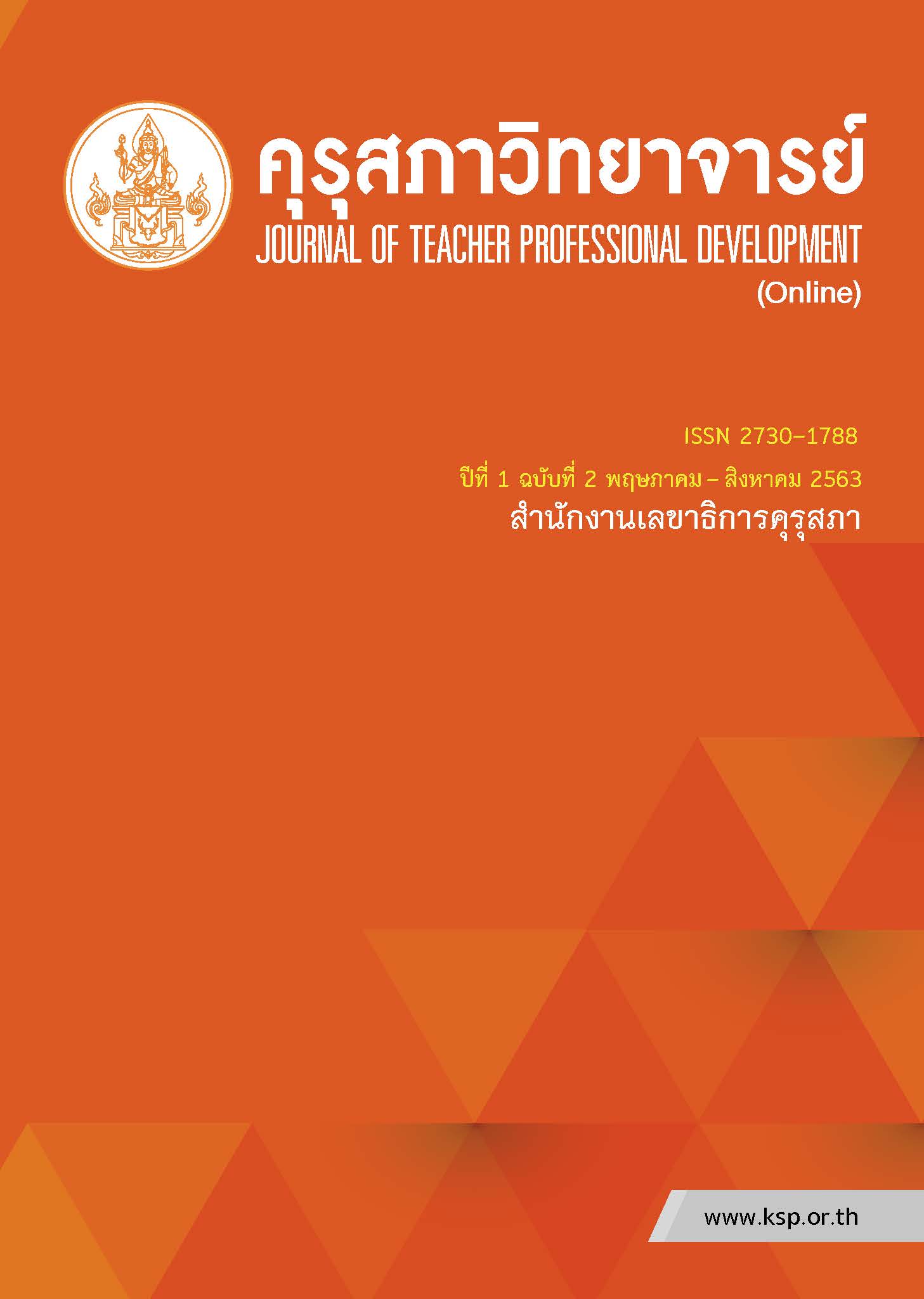การมีส่วนร่วมในการส่งเสริมสังคมแห่งการเรียนรู้เพื่อความพอเพียง ของโรงเรียนบ้านด้ายเทพกาญจนาอุปถัมภ์
Main Article Content
บทคัดย่อ
การวิจัยครั้งนี้มีวัตถุประสงค์เพื่อวิเคราะห์แนวทางและศึกษาองค์ประกอบของการดำเนินงานและบทบาทการมีส่วนร่วมในการส่งเสริมสังคมแห่งการเรียนรู้เพื่อสร้างจิตสำนึกความพอเพียง โดยใช้ระเบียบวิธีวิจัยเชิงคุณภาพในการศึกษาปรากฏการณ์การมีส่วนร่วมในการส่งเสริมสังคมแห่งการเรียนรู้เพื่อสร้างจิตสำนึกความพอเพียงแก่บุคลากรและครูของโรงเรียน เก็บข้อมูลโดยการสัมภาษณ์เชิงลึก และการสนทนากลุ่ม ผู้ให้ข้อมูลหลัก ได้แก่ ผู้บริหารโรงเรียนและครูกลุ่มผู้นำการเปลี่ยนแปลงและขยายเครือข่าย วิเคราะห์ข้อมูลโดย การแปลความหมายข้อมูล การลดทอนข้อมูล จัดหมวดหมู่ข้อมูล และศึกษาความสัมพันธ์ของปรากฏการณ์ เพื่อสร้างข้อเสนอแนวทางการมีส่วนร่วมในการส่งเสริมสังคมแห่งการเรียนรู้เพื่อความพอเพียง
ผลการวิจัยพบว่า แนวทางและบทบาทการมีส่วนร่วมในการส่งเสริมสังคมแห่งการเรียนรู้เพื่อความพอเพียง มี 4 ส่วน คือ 1) ส่วนเนื้อหา ประกอบด้วย สังคมแห่งการเรียนรู้ และความพอเพียง 2) กระบวนการ ประกอบด้วย กระบวนการมีส่วนร่วม และองค์ประกอบการมีส่วนร่วม 3) บทบาทและกิจกรรม ประกอบด้วย ผู้รับผิดชอบโดยตรง ผู้ตัดสินใจ ผู้ให้คำปรึกษา และผู้ที่ควรรับรู้ และ 4) การประเมินผล เป็นการประเมินผลคุณธรรมของนักเรียน ด้านคุณธรรมหลัก และคุณธรรมสนับสนุน สำหรับองค์ประกอบของการดำเนินงานและบทบาทการมีส่วนร่วมในการส่งเสริมสังคมแห่งการเรียนรู้เพื่อความพอเพียง พบว่า มี 2 ส่วน คือ 1) ส่วนเนื้อหา ประกอบด้วย ผู้นำการเปลี่ยนแปลง กลุ่มผู้ตัดสินใจ ผู้ดำเนินการ ผู้นำชุมชน ผู้อำนวยความสะดวกในการดำเนินการ ผู้สนับสนุน และผู้รับรู้ และ 2) ส่วนกระบวนการ ประกอบด้วย การสื่อสาร ขั้นตอนกระบวนการ และเงื่อนไข
Abstract
The purposes of this research were to analyze operational guidelines and engagement roles and to explain the operational elements and the participative roles in promoting a learning society for sufficiency awareness. Qualitative research methodology was employed to study participation phenomena in promoting a learning society for raising sufficiency awareness of administrators and teachers. In-depth interviews and focus group discussions were used as methods of data collection. Key informants included school administrators and group of change-leading teachers. Data were analyzed using data interpretation, data reduction, coding, categorizing, grouping into themes and finding relationships of the phenomena to propose guidelines for participation in promoting a learning society for sufficiency awareness.
The findings of this research revealed that Guidelines and roles for participation in promoting a learning society for sufficiency, carried out in 4 parts. First, Content consisted of a learning society and sufficiency. Second, Process consisted of participation process and participation elements. Third, Roles and activities consisted of responsible person, accountable/approver, Consultant, and informed persons. Fourth, Evaluation was an evaluation of student morality and some moral supports. Regarding to Components of operations and participation roles in promoting a learning society for sufficiency, two components were found. First, the content consisted of change agent, regulator/policy maker, Implementer, community leader, facilitator, supporter and Informed. Second, the process part consisted of process components including communication, procedures, and conditions
Article Details
เนื้อหาและข้อมูลในบทความที่ลงตีพิมพ์ในวารสารคุรุสภาวิทยาจารย์ ถือเป็นข้อคิดเห็นและความรับผิดชอบของผู้เขียนบทความโดยตรง ซึ่งกองบรรณาธิการคุรุสภาวารสารไม่จาเป็นต้องเห็นด้วย หรือร่วมรับผิดชอบใด ๆ บทความ ข้อมูล เนื้อหา รูปภาพ ฯลฯ ที่ได้รับการตีพิมพ์ในวารสารคุรุสภาวิทยาจารย์ ถือเป็นลิขสิทธิ์ของวารสารคุรุสภาวิทยาจารย์ หากบุคคลหรือหน่วยงานใดต้องการนาทั้งหมดหรือส่วนหนึ่งส่วนใดไปเผยแพร่ต่อหรือเพื่อกระทาการใด ๆ จะต้องได้รับอนุญาตเป็นลายลักอักษรณ์จากวารสารคุรุสภาวิทยาจารย์ก่อนเท่านั้น
เอกสารอ้างอิง
นพพงษ์ บุญจิตราดุล. (2534). หลักการบริหารการศึกษา. กรุงเทพฯ: บริพัตรการพิมพ์.
นิศา ชูโต. (2548). การวิจัยเชิงคุณภาพ. (พิมพ์ครั้งที่ 3). กรุงเทพฯ: พริ้นต์โพร.
มูลนิธิมั่นพัฒนา. (2554). ศาสตร์พระราชา...ศาสตร์เพื่อการพัฒนาที่ยั่งยืน. (ออนไลน์): สืบค้นเมื่อ
สิงหาคม 7, 2560, จาก http://www.manpattanalibrary.com/newsdetail.php?id.
วัชราภรณ์ อภิวัชรางกูร. (2546). รูปแบบการสร้างแรงจูงใจในการร่วมพัฒนาโรงเรียนส่งเสริม
สุขภาพ: กรณีศึกษาโรงเรียนวัดห้วยหิ อำเภอบ้านค่าย จังหวัดระยอง.
วิทยานิพนธ์คุรุศาสตรดุษฎีบัณฑิต สาขาการบริหารการศึกษา, จุฬาลงกรณ์มหาวิทยาลัย.
สำนักงานคณะกรรมการพัฒนาการเศรษฐกิจและสังคมแห่งชาติ. (2560). สรุปสาระสำคัญ
แผนพัฒนาเศรษฐกิจและสังคมแห่งชาติ ฉบับที่สิบสอง พ.ศ. 2560 – 2564. กรุงเทพฯ:
สำนักนายกรัฐมนตรี.
สำนักงานเลขาธิการสภาการศึกษา. (2551). กรอบทิศทางการพัฒนาการศึกษาในช่วงแผนพัฒนา
เศรษฐกิจและสังคมแห่งชาติฉบับที่ 10 (พ.ศ. 2550-2554) ที่สอดคล้องกับแผนการศึกษา
แห่งชาติ (พ.ศ. 2545-2559) ฉบับสรุป. กรุงเทพฯ: โรงพิมพ์แห่งจุฬาลงกรณ์มหาวิทยาลัย.
สุภางค์ จันทวานิช. (2548). วิธีการวิจัยเชิงคุณภาพ. พิมพ์ครั้งที่ 13. กรุงเทพฯ : สำนักพิมพ์แห่ง
จุฬาลงกรณ์มหาวิทยาลัย,
Arnstein, Sherry R. (1969). A Ladder of Citizen Participation. Journal of the American.
Planning Association, 35, (4), 216-224.
Barnard, Chester I. (1983). The Function of the Executive. 28th ed. London: Harvard
University.
Holden, M. and Conelly, S. (2004). The Learning City: Urban sustainability education
and building toward WUF legacy. In H. P. Oberlander (ed.) The Vancouver
Working Group Discussion Papers for the World Urban Forum. Ottawa:
Government of Canada.
Senge, P. M.. (1990). The Fifth Discipline: The Art and Practice of the Learning
Organization. New York: Doubleday/Currency
Strauss, A. L. and Corbin, J. M.. Basic of Qualitative Research: Techniques and
Procedures for Developing Grounded Theory. 2nd ed. California: Sage
Publication. Value Based Management.net. 2016. Agreeing on Roles and
Responsibilities: Summary of RACI. (Online). Retrieved August 21, 2017, From:


